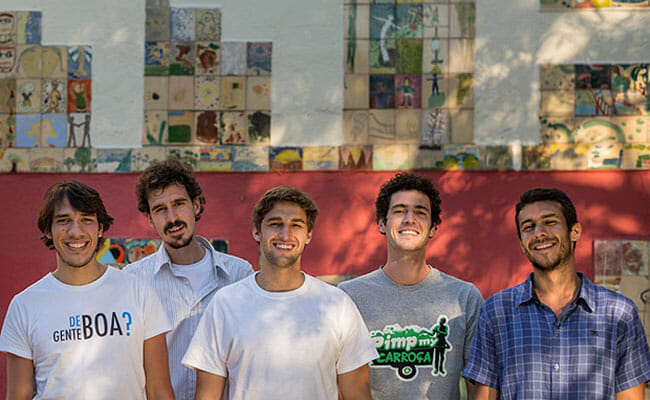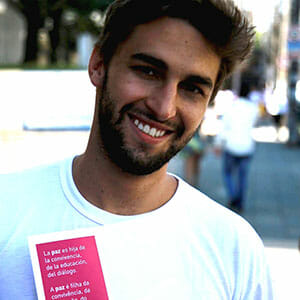Call of a Global Movement: Empowering Volunteers to Solve Social Challenges in Brazil

Across the globe, volunteers use their time, talent and resources to tackle tough challenges and build stronger, more vibrant communities. With our global network of more than 200 affiliates, Points of Light will celebrate International Volunteer Day on December 5, recognizing volunteers in communities around the world who answer the call to serve, every day and especially in times of need.

As part of this celebration, we are spotlighting a few of our affiliate leaders to share the story of their work and how their volunteers are making a difference locally. In São Paulo, Brazil, André Cervi – cofounder of our affiliate Atados – is inspired by individuals and nonprofits that continually innovate to achieve greater impact in their communities. Atados connects people who want to volunteer in social and environmental causes to nonprofits who need their help. The organization is particularly well known for developing innovative projects such as Abraço Cultural, a language center designed to create jobs and entrepreneurship opportunities for refugees, and to encourage cross-cultural sharing and learning.
We spoke with André to learn more about what drives him, and how Atados is helping volunteers and nonprofit partners address social and institutional challenges.
As the cofounder of Atados, what inspires and drives you?
The work of the nonprofits we partner with inspires me a lot. They usually face several constraints, but they are always innovating in their approach to achieve more impact.
How did you get started in the volunteer space, and what led you to create Atados?
We started Atados because we discovered that many friends and colleagues wanted to volunteer, but did not know an easy and trustful way to connect with NGOs and volunteer opportunities. In the beginning, we visited almost 70 NGOs to understand their needs and how Atados could help them.
The theme of International Volunteer Day this year is “Volunteers Act First. Here. Everywhere.” In your community, how do volunteers act first?
Many times, volunteers are part of informal groups that are directly involved with causes. For example, many people in Brazil organize in groups to help refugees in legal issues, to donate health kits, or to teach Portuguese and help refugees integrate into the Brazilian culture. Their approach is usually faster than the work of nonprofits and, sometimes, these groups evolve into formal NGOs or partner with already established NGOs. To conclude, the work of volunteers, whether in informal groups or with NGOs, is fundamental for social development.
How do you draw volunteers’ attention to real problems in their communities and equip them to be changemakers themselves?
We believe that the volunteer activity has to be more than just a work. When we organize these activities, we always separate some time for volunteers to feel the experience and interact with the public, so they can be more empathic and understand better the reality they are entering.
What advice do you give to individuals who want to get involved, but don’t think they can make a difference?
My advice is to believe in the power of a network. Maybe one person can´t make a huge difference, but a small group of engaged people that can mobilize others has the opportunity and the power to create a real change. It´s also important to remember that all leaders also have many supporters for their cause.
What has been the biggest benefit of being part of Points of Light’s affiliate network?
The biggest benefit is the possibility to exchange knowledge and volunteering practices with organizations around the world. The practice of sharing is crucial for the development of the social sector, and we brought many innovations to Brazil by learning with other global partners.
What emerging trend in volunteerism are you most excited about?
In Brazil, I see two trends that excite me:
First, many volunteers are working in political education with youth. Brazil is facing a political crisis due to corruption, and many youth don’t have any hope in politicians. Volunteers are teaching them how the political system works, and how it´s possible to “hack” the system to fight for citizens’ rights.
Second, I also see a trend of volunteering empowerment, where volunteers take a more active approach to social problems. NGOs are giving more space for volunteers to innovate inside the organization and develop specific solutions to social and institutional challenges. Also, many volunteers are creating new projects and becoming social entrepreneurs.
